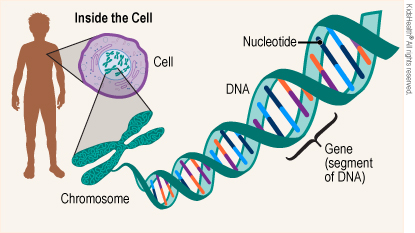Chromosomes
Say: KRO-muh-soamz
Your body is made up of billions of cells, which are too small to see without a strong microscope. Inside most of those cells are chromosomes, which are thread-like strands that contain hundreds, or even thousands, of genes. Genes determine physical traits, such as the color of your eyes. Most people have 23 pairs of chromosomes — half from their mother and the other half from their father. Even after you're born, your 46 chromosomes continue to guide the way your body grows and develops.

